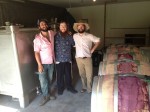Left to right, Ari Cipes, Rabbi Shmuly Hecht and Ezra Cipes have joined forces to help make Summerhill Pyramid Winery’s Tiferet, the only kosher uncooked wine in Canada. (photo from summerhill.bc.ca)
The rolling hills and verdant valleys of British Columbia’s Okanagan region are home to more than 200 wineries, many of which are internationally renowned and award-winning. In fact, a number of Canada’s most prestigious wineries call this region home – Mission Hill, Cedar Creek, Sumac Ridge, to name a few – with one singled out as “B.C.’s most visited winery” by Tourism Kelowna.
There are several possible reasons for Summerhill Pyramid Winery’s popularity. It could be the incongruous sight of the enormous, dazzling white pyramid towering over the central terrace (more on that later). Perhaps it’s because of the estate’s Peace Park or the quality of its 100 percent organic vineyard. Then there’s the winery’s most recent offering, Tiferet (Hebrew for beauty/glory), a new, top-of-the-line kosher wine whose very name reflects the exceptional landscape from which it was created.
Summerhill Pyramid Winery was founded by native New Yorker Stephen Cipes, who moved to the Okanagan with his young family in 1986 and felt an immediate spiritual connection with the land. The developer-turned-vintner purchased Summerhill Vineyards, replanted the existing table grapes with winemaking European grapes and set to work. Located on Kelowna’s Lakeshore Wine Route, the mid-size winery has been producing organic, award-winning wines ever since, making a name for itself in European capitals.
Now, three of Cipes’ four sons are involved in managing the family business. Chief executive officer Ezra Cipes spoke with the Jewish Independent from his office, which overlooks the magnificent, blue waters of Lake Okanagan.
The immediate question at hand was why the winery had decided to produce a kosher wine, especially an extremely limited edition one (1,200 bottles) with a hefty price tag ($100 per bottle). Cipes explained that he was inspired by his friendship with Okanagan Chabad Rabbi Shmuly Hecht and a desire “to share the beauty of natural, uncooked wine with Hecht and all Sabbath observant Jews.”
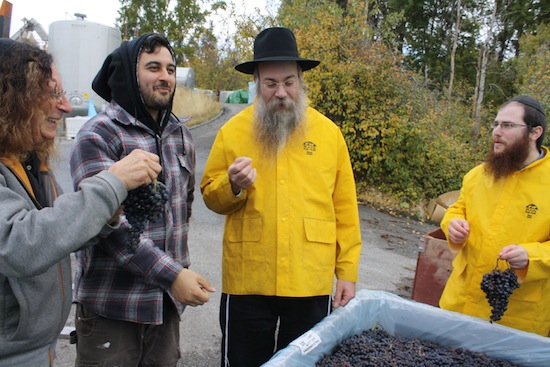
Cipes and Hecht formed a deep bond while “studying texts together and drinking mevushal [cooked] wine together,” Cipes explained. “None of [the cooked kosher wines] can compare with living, uncooked wine, and I realized that Rabbi Hecht did not know the pleasure of living wine. There was none available to share with him, so we decided to make it ourselves, and we set out to make it as beautiful as possible. We used the best grapes of the vintage, bought the best barrels from France and now, a year and a half later, I am pleased to say that the wine we made exceeded my expectations.”
Kosher winemaking is somewhat complicated. Governed by the same kashrut laws pertaining to food (prepared under supervision of a rabbi, containing only kosher ingredients, using rabbinically certified equipment), kosher wine is further divided into two categories: uncooked and cooked. Although both are considered equal with respect to kashrut, their production and final result couldn’t be more different.
To qualify as kosher uncooked wine, the wine’s entire production – from “vine to wine” in vintner vernacular – must be handled exclusively by Sabbath-observing Jewish males. And that includes pouring. Understandably, it is well-nigh impossible for commercial producers to comply with these conditions and most opt to make the cooked category of kosher wine, if they produce such wine at all. Kosher cooked winemaking allows non-Jews of both genders to handle production and serving, however, the other regulations are no less strict. For a wine to qualify as kosher cooked, it must be heated to 1850F, which, well, cooks it. And therein lies the rub.
Exposure to such high temperatures significantly compromises the wine’s flavor and texture and, while most producers now use flash-pasteurization techniques to minimize the damage, there is simply no way around it. “Wine is a living thing…. By cooking the wine, we are destroying the wine,” Cipes’ explained matter-of-factly. The dilemma facing kosher wine vintners is best summed up as having to choose between quality and quantity, taking into account the obvious economics that accompany those choices.
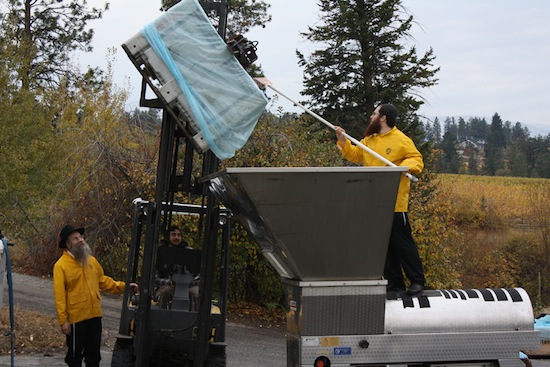
Which brings us back to Tiferet, whose kosher uncooked status partly explains its steep price. Cipes acknowledged the challenge of producing uncooked wine and described Tiferet’s creation as “a labor of love.”
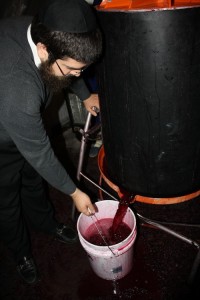
“The complication is that only the hands of Sabbath-observant Jews could touch the wine, equipment or any unsealed vessel containing the wine,” he said. “We had to make the wine away from our regular wine cellar, and without the trained hands of our regular team. But otherwise, it was the most simple and natural process: crush the grapes, allow the fermentation to happen … press the juice from the skins … age in barrels, blend the barrels … allow the solids to settle … rack the wine … and seal it in a bottle. Rabbi Shmuly or myself was there every single day except for Shabbos, checking the temperature of the room or performing some task. For such a simple process, the quality of the wine comes from the quality of the fruit, the careful handling, and creating the correct conditions for the fermentation and maturation.”
Tiferet was made with a relatively new “meritage” blend (merit/heritage), a delicate balance of Bordeaux-inspired grape varieties – merlot (60 percent), cabernet sauvignon (20 percent) and cabernet franc (20 percent) – cultivated in the semi-arid conditions of an Osoyoos organic vineyard and then brought to Summerhill to be turned into something that sounds much more than a run-of-the-mill premium wine.
“Making [Tiferet] with the rabbis changed its way,” Cipes said, trying his best to explain his sense that something else was at work during the creation of Tiferet. “In a way, the wine made itself, there was some magic that happened there. It’s hard to put my finger on it … a certain element of magic happened naturally that wouldn’t have happened otherwise … it was the work of the elements, and of natural forces beyond our control. We can only take credit for partnering with these forces to create this incredible wine.”
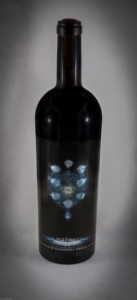
The description of Tiferet on Summerhill’s website diverts sharply from adjectives usually associated with wine flavor and aromas. Forgoing the more mundane “‘fruity” or “crisp,” Summerhill goes out on a metaphorical limb declaring, “Tiferet has the aroma of baby’s breath and the flavor of mother’s milk.” (If you’re wondering, as did I, the reference is not to genus Gypsophila, most commonly found in English country gardens!)
On the telephone, Cipes struggled to articulate the sensory sensations evoked by this wine. “It has a sweet milkiness … an unusual flavor, a sweet dairy note that doesn’t linger for long … it’s almost an effervescence. The texture is … full- bodied, soft and kind of silky in your mouth, elegant, fresh, fruity. There’s an added complexity to the wine,” before returning to the rather odd-sounding, “It’s like baby’s breath.” Tiferet wine, Cipes concluded, is for a drinker who “want[s] to have an experience of beauty.” With my request for a sample politely but firmly declined, and a price tag sadly out of reach, I’ll just have to take his word for it.
But, wait. What about the promise for more about that huge, looming pyramid, rivaling only the great pyramids of Egypt for alignment and precision? And the new-age-sounding Peace Garden? You’ll have to visit the winery in person to learn more – and, while you’re there, could you bring me back a bottle of that magic?
Nicole Nozick is a Vancouver-based freelance writer and communications specialist.
(Tiferet, $100 per 750-millilitre bottle, is available only through the winery: summerhill.bc.ca/product/2012-tiferet.)

